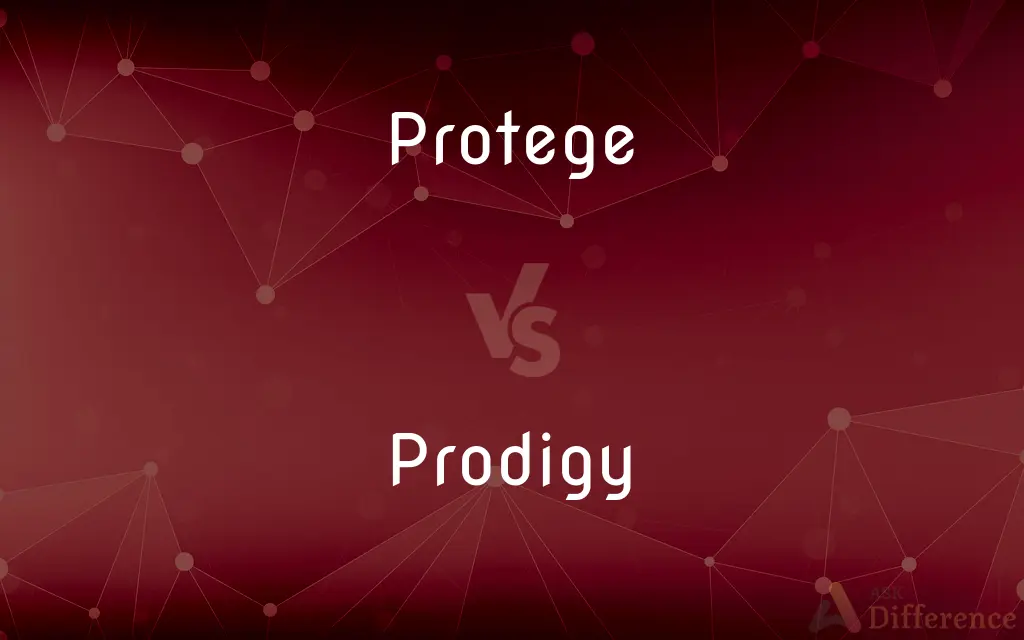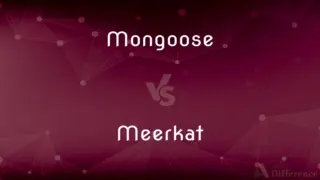Protege vs. Prodigy — What's the Difference?
By Maham Liaqat & Urooj Arif — Updated on March 31, 2024
A protege is someone guided by a mentor, while a prodigy shows exceptional talent at a young age.

Difference Between Protege and Prodigy
Table of Contents
ADVERTISEMENT
Key Differences
A protege is typically someone who receives direct guidance, support, and mentoring from an experienced individual. Whereas, a prodigy is a young individual who exhibits extraordinary abilities or talents in a specific field, often from a very young age, without the implied necessity for a mentor.
The relationship between a mentor and a protege is based on the transfer of knowledge, skills, and insights, aiming to foster the protege's professional growth or skill development. On the other hand, a prodigy's abilities are usually inherent and self-manifested, though they may benefit from mentoring to hone their skills.
Proteges are often chosen or accepted by their mentors based on potential, dedication, or shared interests, suggesting a mutual commitment to the development process. In contrast, prodigies are recognized for their exceptional skills and may attract mentors who wish to help cultivate their innate talents.
While the concept of a protege emphasizes the role of external support and guidance in achieving excellence, the concept of a prodigy focuses on innate talent and exceptional natural ability, irrespective of formal mentorship.
The success of a protege is frequently attributed to the quality of mentorship received, as well as the protege's own efforts and dedication. Conversely, the acclaim received by a prodigy is primarily due to their remarkable natural abilities and the early age at which they demonstrate these skills.
ADVERTISEMENT
Comparison Chart
Definition
Someone mentored by a more experienced person
A young person with exceptional talents or abilities
Key Element
Guidance and mentorship
Innate talent and exceptional ability
Age
Not necessarily young
Typically young
Dependency
On mentor’s support and knowledge
Primarily on natural ability
Outcome
Professional growth or skill development
Early demonstration of extraordinary skill
Recognition
For potential and dedication
For innate talent and achievements
Mentor Relationship
Essential for development
Beneficial but not necessary
Compare with Definitions
Protege
Mentored individual with potential.
The young artist became the protege of a renowned painter.
Prodigy
Young individual with exceptional talents.
A child prodigy, she played piano compositions by ear at age four.
Protege
Relationship based on mentorship.
His role as a protege allowed him to learn from the best in the field.
Prodigy
May or may not have formal mentorship.
Despite limited formal training, the prodigy excelled in mathematics.
Protege
Achievements attributed to mentorship.
The protege's success was a testament to their mentor's guidance.
Prodigy
Talent often seen as innate.
The musical prodigy's abilities were evident from a very young age.
Protege
Growth and development focused.
The protege developed new skills under her mentor's tutelage.
Prodigy
Demonstrates early skill mastery.
The prodigy's art was exhibited in galleries worldwide.
Protege
Benefits from guidance and knowledge.
As a protege, she received opportunities that accelerated her career.
Prodigy
Recognized for inherent abilities.
The prodigy won international chess competitions before turning ten.
Protege
One whose welfare, training, or career is promoted by an influential person.
Prodigy
(Archaic) A portentous sign or event; an omen.
Protege
Alternative form of protégé
Prodigy
A person with exceptional talents or powers
A math prodigy.
Protege
One under the care and protection of another.
Prodigy
An act or event so extraordinary or rare as to inspire wonder
"The Spies performed prodigies of activity in clambering over the rooftops and cutting the streamers that fluttered from the chimneys" (George Orwell).
Protege
A person who receives support and protection from an influential patron who furthers the protege's career
Prodigy
An extraordinary thing seen as an omen; a portent.
Prodigy
An extraordinary occurrence or creature; an anomaly, especially a monster; a freak.
Prodigy
An amazing or marvellous thing; a wonder.
Prodigy
A wonderful example of something.
Prodigy
An extremely talented person, especially a child.
Prodigy
Something extraordinary, or out of the usual course of nature, from which omens are drawn; a portent; as, eclipses and meteors were anciently deemed prodigies.
So many terrors, voices, prodigies,May warn thee, as a sure foregoing sign.
Prodigy
Anything so extraordinary as to excite wonder or astonishment; a marvel; as, a prodigy of learning.
Prodigy
A production out of ordinary course of nature; an abnormal development; a monster.
Prodigy
An unusually gifted or intelligent (young) person; someone whose talents excite wonder and admiration;
She is a chess prodigy
Prodigy
A sign of something about to happen;
He looked for an omen before going into battle
Prodigy
An impressive or wonderful example of a particular quality;
The Marines are expected to perform prodigies of valor
Common Curiosities
What distinguishes a protege's success from that of a prodigy?
A protege's success is often attributed to both mentorship and personal dedication, while a prodigy's success is primarily due to their extraordinary natural talent.
How does mentorship play a role in the development of a protege and a prodigy?
For a protege, mentorship is crucial for development and success, while for a prodigy, mentorship can enhance innate talents but is not a prerequisite for their exceptional abilities.
What is a protege?
A protege is an individual who is guided and supported by a more experienced mentor, focusing on personal and professional development.
What is a prodigy?
A prodigy is a young individual who displays exceptional talents or abilities in a specific field, often from a very early age.
Are there fields where prodigies are more common?
Prodigies are often found in fields like music, mathematics, chess, and art, where exceptional talent can be demonstrated through performance or competition.
What challenges do prodigies face?
Prodigies may face high expectations, pressure to perform, and the challenge of balancing their talents with a normal childhood.
How does society view proteges and prodigies?
Society often views both with admiration, but the fascination with prodigies stems from their rare, innate talents and early achievements.
Can a prodigy also be a protege?
Yes, a prodigy can become a protege if they receive mentorship to further develop their talents.
What are the benefits of being a protege?
Being a protege offers personalized guidance, access to networks, and accelerated learning and opportunities.
Do prodigies always achieve long-term success?
Not necessarily; long-term success for prodigies can depend on various factors, including support, opportunities, and personal choices.
How do proteges and prodigies contribute to their fields?
Proteges contribute through their learned skills and growth, while prodigies often push the boundaries of what is considered possible with their innate talents.
Can mentorship change the trajectory of a protege's career?
Yes, effective mentorship can significantly influence a protege's career direction and success.
How can one identify a prodigy?
Prodigies are usually identified through their ability to perform at a level significantly advanced for their age, often in a specific domain.
Is age a factor in defining a protege or a prodigy?
Age is more significant for a prodigy, who is typically identified in childhood, whereas a protege can be of any age.
What makes a successful mentor-protege relationship?
A successful mentor-protege relationship is built on mutual respect, clear communication, and a shared commitment to the protege's development.
Share Your Discovery

Previous Comparison
Candy vs. Chocolate
Next Comparison
Mongoose vs. MeerkatAuthor Spotlight
Written by
Maham LiaqatCo-written by
Urooj ArifUrooj is a skilled content writer at Ask Difference, known for her exceptional ability to simplify complex topics into engaging and informative content. With a passion for research and a flair for clear, concise writing, she consistently delivers articles that resonate with our diverse audience.














































